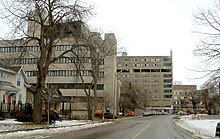(KGH from King Street. Burr Wing is the second light tan structure)
The lack of urgency compared with my 1990 surgery (3 days after diagnosis then as opposed to 3 months now) is mostly because prostate cancer grows very slowly and testicular cancer is very aggressive.
Of the four hours, about 45 minutes was with the oncologist and 20 with the surgeon (who also performed the biopsy on February 8), plus medically-related interviews with nurses and students (all of the Kingston hospitals are administratively joined and associated with the Queen's medical school). Most of the rest was paperwork, plus about an hour total of travelling or waiting.
The oncologist gave me a long rundown of my medical condition and the clinical evidence relevant to making a decision about treatment. My tumour stage was T1c (detected via biopsy after PSA tests), four of ten biopsy samples had cancer (thus it probably hasn't grown a lot yet); most recent PSA 8.7; no signs of bone metastasis; lymph node spread unlikely. He described the radiation-related treatment options. The usual method is 38 days of daily (weekdays) treatments of External Beam Radiation therapy. The alternative is brachytherapy (insertion of radioactive material directly into the prostate, of which there are two methods both of which require trips to Ottawa or Toronto at the moment), followed by fewer EBRT sessions. He reassured me that if cancer had breached the prostate capsule or spread to the seminal vesicles, both surgery and radiation would take care of the problem.
The surgeon knew not to repeat what the oncologist told me about the basics; good communication is why both hold clinical hours in the same building at the same time. He told me robotic surgery was available in Ottawa and Toronto but I didn't think very hard about that choice; travelling did not appeal to me. I asked about more details than when I saw him on March 8, including how soon it could take place and how long I'd be off work. For a desk job he recommended six weeks; I could have come back a little sooner, but sitting all day isn't great after abdominal surgery. For other kinds of job time off would be longer.
The main issue for me is that I already had radiation in overlapping areas back in 1990. Tissue has a lifetime amount of radiation it can absorb and recover from, so I have increased risk of bowel complications if I were to have any form of radiation therapy. Otherwise, at my age and state of health, both forms of treatment would be equally reasonable. So the decision was pretty straightforward: risks of various forms of complication are a little different in each case, but with both doctors recommending the same treatment and with my higher than average risks from radiation, surgery seemed like the best choice for me.
Given my surgeon's schedule, he won't be able to do the surgery until May or more likely early June. That feels like a long time to wait, but at my age time passes pretty quickly; each new day is a smaller fraction of my remembered life. Once the results for today's CT scan are in, likely a few days, my anxiety levels may decrease to the point where I can actually do things with my brain again.

No comments:
Post a Comment